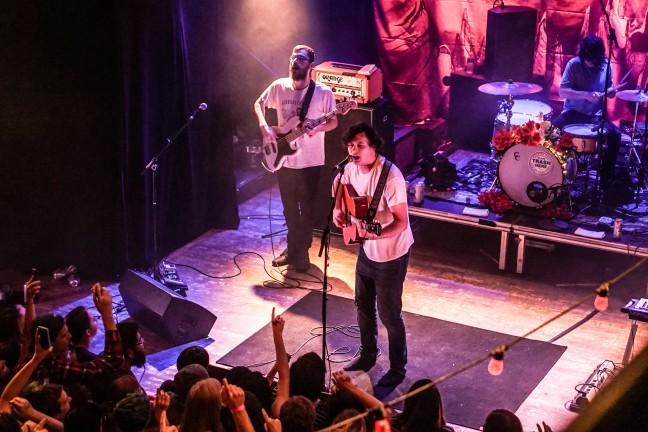The Front Bottoms’ show at Madison’s Majestic Theatre attracted a crowd of devoted fans with their darkly comedic music, proving pop-punk hasn’t completely retreated to the East Coast.
Though the glory days of pop-punk music sadly came to an end at some point in the mid 2000s — arguably after Blink-182’s first breakup in 2005 — The Front Bottoms have not let pop music’s shift in genre affect their success.
The acoustic indie punk band has been at the forefront of the East Coast punk scene since dropping their self-titled debut album in 2011, and garnered fans at basement shows long before that.
Their darkly comedic music finally made it to Wisconsin with their show at Majestic Tuesday night.
While front man Brian Sella was initially amused with Wisconsin culture, it seemed he could easily assimilate — he asked the crowd to buy him a 32 ounce PBR, which he said he’d never had seen before.
Thanks to their dark sense of humor, they’ve amassed quite the cult following — along with the band, fans at the show screamed the lyrics, “There is comfort at the bottom of a swimming pool” with relentless excitement.
While at times the screaming audience drowned out the band members’ voices, the fans were too devoted to care.
Everyone wants to be friends with front man Brian Sella and for good reason — the man is hilarious. At the show, he kept talking about his newfound obsession with cheese curds, and rumor has it he read a chapter of “The Hobbit” during the band’s break earlier on the tour.
Fans’ devotion might just come down to their relatability — many fans consider themselves first as friends rather than just supporters of the band.
The Front Bottoms drew from all their albums, playing new songs like “Motorcycles” and “Ginger” while rocking out their original hits, such as “Flashlight” and “Father.”
The Front Bottoms have an extremely unique sound, especially for the pop-punk community they appeal to. Their songs are heavily acoustic and don’t have the classic heavy drumming typical of their genre, but surprisingly, especially considering the number of first-time listeners present, the crowd formed a mosh pit.
But the moshers’ passion diluted their aggravation, possibly because they connected with the band’s music and lyrics on a higher level. It was an ideal pit; everyone had smiles from ear to ear, singing along and hugging after each song ended. Whether they knew it or not, everyone in that pit became friends.
The pop-punk craze may have come full circle back to the East Coast, but The Front Bottoms are keeping the angst alive.


